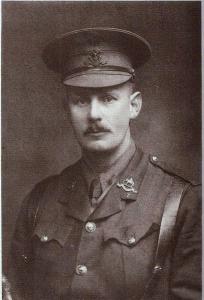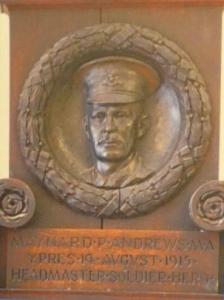
|

|
| Captain Maynard Percy ANDREWS | |
|
A Company, 1/ 4th Battalion Duke of Wellington’s (West Riding Regiment) Date of birth: 17th September 1870 Date of death: 14th August 1915 Killed in action aged 44 Buried at Colne Valley Cemetery Row C Grave 7 |

|
| Maynard Percy Andrews was born at Claypit Street, Whitchurch in Shropshire on the 17th of September 1870 the only son of the Reverend Percy Andrews, Rector of Southover, and Matilda Frances (nee Clarke) Andrews of Claypit Street, later of Harrogate in Yorkshire. He was christened at Whitchurch on the 19th of October 1870. He suffered an attack of typhoid fever when he was a child which permanently impaired his health. He was educated at St Salvators School, St Andrews, Sedbergh School and by private tutors. He matriculated for Oriel College Oxford on the 25th of October 1889 where he later achieved a MA. His time at university was interrupted by illness and he went to America for two years where he worked as a cowboy in the Rocky Mountains although he continued to suffer from asthma all his life. He returned from North America, landing at Liverpool on board the SS “Mongolian” on the 14th of August 1894. On leaving university in 1895 he taught for a while at schools in Melrose and Leicester before deciding to specialise in modern languages, entering the University of Jens in 1899. He taught at an experimental school for a while before becoming a student at the Sorbonne. He was married to Charlotte Jane (nee Gray) Andrews at the Holy Trinity Dean, Edinburgh on the 22nd of April 1897 and they had a son and two daughters; Frances Stewart born on the 15th of May 1898, Maynard Campbell born on the 16th of August 1902 and Leila Kathleen born on the 17th of February 1906. He returned to England in 1902 where he became a school master at Bolton School and later at Elizabeth College in Guernsey. In 1908 he accepted the post of Senior Modern Languages Master at Lancing College. While at Lancing he applied for a commission in the Officer Training Corps on the 17th of November 1909 in an application which was supported by the Reverend Bowlby, Head Master of Lancing College. He was commissioned as a 2nd Lieutenant the Officer Training Corps on the 29th of October 1909. He achieved Certificate A at Guildford on the 18th of January 1910 and served on attachment for training to the East Surrey Regiment at Kingston from the 3rd of to the 18th of January 1911 achieving Certificate B on his last day there. He left the College in 1911. In the autumn of 1911 he was appointed as headmaster at Hipperholme Grammar School in Yorkshire. On moving to his new position, he was attached to the Duke of Wellington’s Regiment with the rank of 2nd Lieutenant on the 21st of July 1911, being promoted to Lieutenant on the 1st of October 1911 and to Captain on the 27th of September 1914 when he was appointed as commanding officer of A Company. He was mobilised for war service on the 5th of August 1914. At 12.15pm on the 14th of April 1915 the 1/4th Battalion Duke of Wellington’s (West Riding Regiment) embarked on trains at Doncaster bound for Folkestone where they arrived at 7.10pm.By 8.10pm they had completed their embarkation on board a ship and they arrived at Boulogne at 9.45pm. Half an hour later they had completed disembarkation and they marched eight miles uphill to a rest camp. On the 10th of August 1915 the battalion received orders to move to the left sector of the trenches which ran along the canal bank in the north west of the Ypres Salient. The relief began at 10am and was completed by 1.30pm. On the 13th of August Maynard Andrews' A Company relieved C Company in trench F30. At 4.45pm on the 14th of August 1915 an enemy shell landed on a dugout in trench F30, which collapsed it, killing three men outright and wounding three more, one of who died shortly afterwards. Maynard Andrews rushed to the spot and assisted in digging out the buried men and rescuing the wounded. Due to the narrowness of the trench Andrews decided that, in order to save time, it would be necessary to carry one of the wounded men over the top of the trench to the communication trench across open ground, in full view of the enemy. One of his men remembers: - "Just before doing this brave deed, he said to the men. "This is a dangerous undertaking, I will go with you boys"." He helped the stretcher bearers lift their burden out of the trench and out into the open under heavy rifle and artillery fire but, just short of their objective, he was hit by a bullet in the throat and fell. The stretcher bearers, Private 2108 G. Holt, Private 2400 J. Shelley and Lance Corporal 1734 C. Wood went to his aid but soon realised that there was nothing they could do for him so returned to the wounded man on the stretcher, who by this time had been hit by another bullet. Lieutenant B. Hughes, the Battalion Medical Officer, went over the parapet under fire to attend to Maynard Andrews and the wounded man but, finding Andrews beyond help, he helped carry the stretcher to cover. The Battalion history said: - "So perished one of the most gallant gentlemen and conscientious officers who ever served with the battalion." His funeral, and that of the four other men who had died, took place the following day at the cemetery which stood behind Brigade Headquarters. The men were: - Private 4/1679 Charles Edward Lee, Corporal 4/1166 Norman Hirst, Lance Corporal 4/1442 James Riach and Private 4/2965 John Thomas Aked. Charlotte Andrews was at Arundel, waiting for his return on leave, when she received the telegram telling her that her husband had been killed in action. Brigadier E. Brereton, Commanding Officer 14th Infantry Brigade wrote:- “May I convey to you my profound sorrow and deepest sympathy in your terrible loss. Your husband was killed whilst not only doing his duty, but going almost beyond it in assisting wounded men. I am bringing his gallantry to the notice of higher authorities. He died a noble death. I can only say that his battalion has lost, in my opinion, it’s very best officer, and the Brigade a most gallant and exceptionally good officer. A short time ago I was pleased to able to tell your husband that the Major General commanding the Division had mentioned to me that in all his many visits to the trenches, to many regiments, he had seldom or never met any officer who was so thoroughly conversant with every detail of his duty as your husband. The Major General told me he was one of the best company officers he had ever met. I can endorse that opinion thoroughly. Your husband's Company has lost a leader who will be very very hard to replace. I feel that we all have not only lost an exceptionally good officer, but a most gallant gentleman. I was present yesterday morning at the funeral. The Rev. Page, our Chaplain read the service. Your husband is buried near the spot where he lost his life and four of his own Company were buried with him, He lies close to the firing line. Please do not attempt to acknowledge this letter. I know what distress and sorrow you are enduring, and will have much to do and think about. I can only say that we have lost a very gallant comrade. There is the consolation, a poor one to you, that your husband lost his life in the noblest manner, giving it for wounded comrades.” Another officer wrote:- “Your husband was heroically helping to carry some of his wounded over a very exposed piece of ground when he was shot in the head and died shortly afterwards. He need not have been doing it, but he went because he would not send another on so dangerous a task. It was an act of magnificent calculated bravery, but it was to be expected of him, for he has acted so ever since he came out here. Both as a soldier and a friend he has set a standard which we can only set before ourselves as an ideal. That is the legacy he has left us and it shows to you in some small way what lengths he went to in serving his country, and how nobly he played his part.” Another wrote: - "To inspire a whole company of men, nay a whole battalion, with a desire to do what is right, and to put before us an example of courage and self sacrifice is a reward very few have been able to say they have achieved. So it is with the Captain that we get right down to the bedrock of principles, to those hidden meanings which hang round such every day words as "duty", "discipline", "sacrifice"." He was mentioned in Sir John French’s despatches of the 1st of January 1916. After the war the family lived at Cricket Field Cottage, Harrow on the Hill. His wife applied for his medals in March 1922. He is commemorated on the war memorial in the assembly hall at Hipperholme Grammar School. The Commonwealth War Graves Commission records the date of his death as being the 15th of August but the battalion history and war diary record it as being the 14th of August 1915 |
|
 | |
| Master |
Back